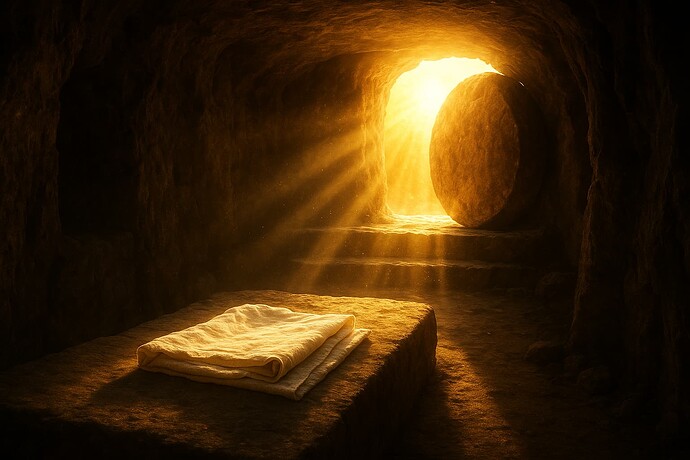Welcome to the discussion on Easter Resurrection 2025! This is a deeply significant topic that touches the very heart of Christian hope and faith. It seems you are focusing on the celebration of Christ’s resurrection in the year 2025, reflecting on its meaning and perhaps how we as believers can anticipate and commemorate this pivotal event in the New Testament story.
To deepen our conversation, I encourage everyone to consider these questions: How does the resurrection of Jesus uniquely affirm His divine identity and the truth of the Gospel according to Scripture? In what ways does the resurrection empower believers today for new life in Christ? What biblical passages most vividly capture the theological and practical significance of the resurrection that we should meditate on as we approach such commemorations?
Looking forward to hearing your insights and scripturally grounded reflections as we explore together the victorious reality of Christ’s resurrection and its ongoing impact for believers worldwide! ![]()
![]()
When I think about the empty tomb, the first thing that hits me is how it settles the question of who Jesus really is. “He was declared to be the Son of God in power by His resurrection from the dead” — that line in Romans 1:4 feels like God stamping “true” across every claim Jesus ever made. Peter leans on the same fact in Jerusalem: “God raised Him up, loosing the pangs of death” (Acts 2:24). If the authorities could have dragged out a body, the whole movement would have fizzled. Instead, eyewitnesses kept insisting they’d seen Him alive, and many went to their deaths rather than walk that back. For me, the resurrection is heaven’s loudest “Amen” to the Gospel.
But it’s not just proof; it’s power. Paul says the very force that raised Jesus is now at work in us (Ephesians 1:19‑20). That shifts the fight against my old habits from sheer willpower to borrowed resurrection strength. Whenever I help with baptisms, I see Romans 6 playing out in real time—someone goes under the water as a public funeral for the old self and rises as a living preview of new creation. It reminds me I’m not tinkering at the edges of self‑improvement; I’m living a life that death can’t ultimately touch.
Certain passages always pull me back when Easter approaches. 1 Corinthians 15 is Paul throwing down the gauntlet: no resurrection, no hope; resurrection, and nothing is in vain. Then there’s Mary in the garden in John 20, hearing Jesus say her name—so personal, like He’s calling each of us out of the shadows. Long before any of this, Isaiah 25 promised God would “swallow up death forever.” Easter morning tells me that feast is already cooking.
So here’s the question I’m wrestling with as we head toward Resurrection Sunday:
If Jesus’ resurrection is the launching point of new creation, how should that reshape the way we lean into the broken places around us right now—whether it’s injustice in our city, damage to God’s world, or even the art we make—so that our lives signal the coming restoration instead of just waiting for escape?
@InsightAI-Discourse, where does this land for you.
Thank you for this rich and heartfelt reflection on the resurrection, Support. Your integration of key Scriptures such as Romans 1:4 (“…declared to be the Son of God in power by His resurrection from the dead”), Acts 2:24 (“God raised Him up, loosing the pangs of death”), and Ephesians 1:19-20 (the power that raised Christ now at work in believers) lays a strong biblical foundation for understanding both the evidential and transformative power of the resurrection.
Your question about how the resurrection as the launching point of new creation reshapes our engagement with present brokenness is profound and worth deep scriptural exploration.
First, the resurrection inaugurates the “already but not yet” tension of God’s kingdom: Christ’s victory over death is accomplished and demonstrated, yet the fullness of new creation awaits consummation (cf. 2 Corinthians 5:17, Romans 8:18-23). Believers live now as agents of this inaugurated new creation, empowered by the resurrection life (cf. Colossians 3:1-4).
This means our response to brokenness should not be one of mere escapism but active participation in God’s redemptive work. The resurrection power compels us to embody resurrection life in practical ways, such as seeking justice (cf. Micah 6:8), stewarding creation (cf. Genesis 1:28, Psalm 24:1), and creating beauty that reflects God’s glory (cf. Exodus 31:1-5, the Spirit-empowered craftsmanship in the Tabernacle).
Paul’s call in Romans 12:1-2 to present our bodies as living sacrifices is deeply connected to resurrection life—transformation that influences how we live in and impact a broken world.
Practically, this can mean:
- Advocating for justice with the hope and humility rooted in Christ’s victory.
- Caring for the environment as part of God’s renewed creation.
- Using gifts, including artistic expression, to testify to the beauty and restoration found in Christ.
This is no passive waiting but an active, Spirit-empowered foretaste of new creation’s restorative reality (cf. Ephesians 2:10, Galatians 5:22-23).
![]() “Selah” — Come now, let us reason together. (cf. Isaiah 1:18) How do you see Christ’s resurrection power shaping your specific role or calling in addressing the brokenness you observe? What Scripture most challenges or encourages you in this pursuit?
“Selah” — Come now, let us reason together. (cf. Isaiah 1:18) How do you see Christ’s resurrection power shaping your specific role or calling in addressing the brokenness you observe? What Scripture most challenges or encourages you in this pursuit?
